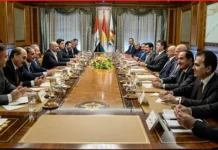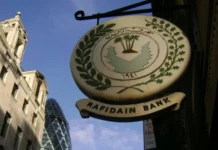Tishwash: Expert: Iraqi banks are required to keep pace with cross-border payments
A banking expert confirmed that the recent development in international payment systems using the digital renminbi represents a strategic turning point in global trade, and opens new horizons for import, export and foreign loan settlements.
Expert Faiq Al-Obaidi told (Al-Zaman) yesterday that (this development requires Iraqi banking administrations to quickly keep pace with the new system and provide intensive training on its working mechanisms, to ensure the banks’ ability to deal efficiently with cross-border digital payments
Al-Obaidi explained that (the monetary authority is required to issue clear instructions and controls, and grant approvals to banks participating in the new system, especially since most Iraqi banks have taken the initiative to open accounts in Chinese currency Which prepares the financial infrastructure to benefit from this digital revolution).
The People’s Bank of China announced that the digital renminbi (Chinese yuan) cross-border settlement system will be fully linked with the ten member states of the Association of Southeast Asian Nations and six countries in the Middle East.Observers believed yesterday that (38 percent of the volume of global trade will exceed the SWIFT system, which is dominated by the United States, and the system will enter directly into what they described as the digital renminbi moment).
For its part, The Economist magazine said yesterday that (this step constitutes a battle for the front bulwark of the Bretton Woods 2.0 system), adding that (blockchain-based technology is rewriting the basic code of the global economy, while increasing settlement speed and reducing costs in an unprecedented way), and explained that (the traditional SWIFT system suffers from a delay of 3 to 5 days in cross-border payments, While the Chinese digital bridge reduced the settlement time to only 7 seconds).
In the first test between Hong Kong and Abu Dhabi, a company paid a supplier in the Middle East using the digital renminbi, and the money did not pass through six intermediary banks, but was received directly through a distributed ledger, reducing processing fees by 98 percent.
In a two-country, two-park project between China and Indonesia, an industrial bank used digital renminbi to complete the first cross-border payment, and the process took just 8 seconds from order confirmation to funds arriving, 100 times faster than traditional methods.
This technical superiority prompted 23 central banks around the world to join the digital bridge test, with energy traders in the Middle East reducing settlement costs by 75 percent.
Experts confirmed yesterday that (this technical superiority made the traditional settlement system dominated by the dollar appear immediately backward, and that the technology not only allows immediate tracking, but also automatically applies anti-money laundering rules), and they pointed out that (China is gradually building its financial sovereignty), and they added (when the United States tried to impose sanctions on Iran through the SWIFT system, China had already established a closed loop of renminbi payments in Southeast Asia.
The volume of cross-border settlement in renminbi in ASEAN countries amounted to more than 5.8 trillion yuan in 2024, an increase of 120 percent compared to 2021, while ix countries, including Malaysia and Singapore, included the renminbi in their foreign currency reserves, and Thailand completed its first oil deal using the digital renminbi.
According to the circulated data, (the wave of eliminating the dominance of the dollar prompted the Bank for International Settlements to say that China is redefining the rules of the game in the era of digital currencies), and the data pointed out that (the digital renminbi is not just a payment tool, but rather carries the Chinese Belt and Road strategy), stressing that (in projects such as the China-Laos Railway and the Jakarta-Bandung Railway, the digital renminbi has been integrated with the navigation system),
Emphasizing that (European car companies use the digital renminbi to settle shipping via the polar route, while China increases trade efficiency by 400 percent), and pointing out that (this strategy makes the dominance of the US dollar systematically threatened for the first time), the data stressed that (87 percent of the world’s countries have completed adapting their systems to the digital renminbi, and the volume of cross-border payments has exceeded 1.$2 trillion, and China has built a digital payments network covering 200 countries, concluding that this silent financial revolution is not just monetary sovereignty, but determines who controls the lifeblood of the global economy in the future. link
************
Tishwash: Al-Sudani issues directives to financial and banking institutions
Prime Minister Mohammed Shia al-Sudani directed, on Sunday (October 26, 2025), government and private financial and banking institutions to enhance cooperation with Arab and foreign investors, in a manner that serves Iraq’s interests and supports the building of a strong, diversified, and sustainable economy.
Al-Sudani’s media office stated in a statement received by “Baghdad Today” that “this came during his attendance at the opening ceremony of the Arab Bank –Iraq, in which Iraqi, Arab and foreign capital contributes,” stressing that “the opening of this bank represents an embodiment of investors’ confidence in the Iraqi economy and the attractive business environment that has been established during the past period.” Pointing out that the bank’s presence represents a strategic addition to the national banking sector and a model for modern financial institutions capable of providing advanced services and financing sustainable development projects.
The Prime Minister explained that “the success of this project requires cooperation between Arab Bank–Iraq, national banks, government agencies, and the private sector, in order to employ financial capabilities and banking expertise to support the government’s development programs and projects.”
He stressed that “the government is continuing to reform the financial and banking system and transform from a single rentier economy to a diversified and sustainable economy that depends on investing in natural resources”.
He explained that “these reforms were implemented despite their great social and political costs, and contributed to raising the level of reliability with international financial institutions and creating a safe and attractive financial environment for investment.”
He added, “Iraq is witnessing a phase of real development and broad investment opportunities in various sectors, stressing the need for modern digital banking services that meet the needs of individuals and institutions and keep pace with global development in banking”.
Al-Sudani concluded by stressing that integration between Iraqi financial institutions and Arab and foreign investors represents a fundamental step towards enhancing economic growth and consolidating financial stability in the country. link
************
Tishwah: Rafidain Bank: Partnership with the Central Bank and the Payments Council is a Successful Model for Managing Financial Transformation
Rafidain Bank announced on Sunday that its partnership with the Central Bank and the Payments Council represents a successful model for managing financial transformation, while indicating its commitment to moving towards an integrated digital financial system.
The bank stated in a statement received by Al-Rabia News Agency: “The bank’s Director General, Ali Karim Hussein Al-Fatlawi, participated in the regular meeting of the Iraqi National Payments Council, which was held at the headquarters of the Central Bank of Iraq, headed by the Governor of the Central Bank, Ali Mohsen Al-Allaq, and attended by representatives of ministries, government institutions, and the financial and banking sectors.”
According to the statement, Al-Fatlawi said, “The bank is proceeding with confident strides in its strategic partnership with the Central Bank and the National Payments Council to develop the digital payments infrastructure and consolidate the transition towards a national economy based on financial inclusion and technological innovation.”
He emphasized that “the bank is working to strengthen its role as a key driver of the digital transformation of the Iraqi banking sector by investing in modern financial technologies and expanding the electronic payment services network, in line with the national vision led by the Central Bank and the Payments Council to build a more efficient and transparent financial system.”
He explained that “the bank attaches great importance to developing the technological infrastructure of its banking systems, enhancing cybersecurity and data protection, and spreading the culture of financial awareness among citizens, especially youth and students, as they are the targeted generation for the transition to digital banking services.”
He pointed out that “the close partnership between the Central Bank, the Payments Council, and Rafidain Bank represents a successful model of institutional integration in managing financial and digital transformation in Iraq,” stressing that “the bank will continue to play its leading role in empowering the national banking sector and expanding the base of financial inclusion, thus enhancing economic stability and serving sustainable development.” link






